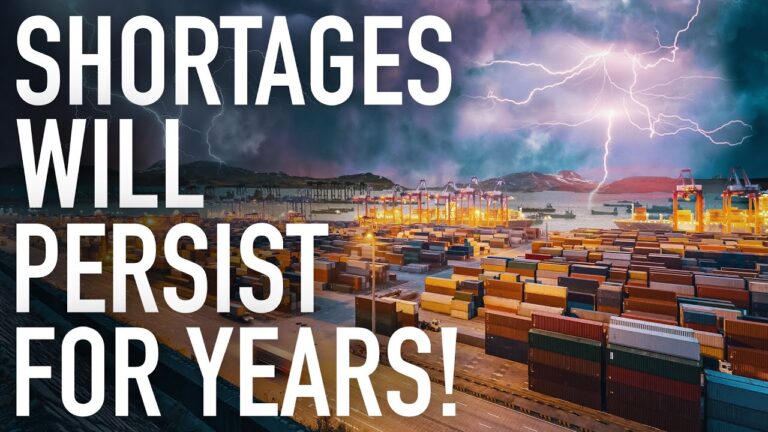The Supply Chain System is Broken and Shortages will Persist
Epic Economist Report, mentions the following points on Supply Chain:
- For what seems like a long time now, we have been reporting the apparently endless shortages that U.S. producers, retailers, developers, and many other businesses have been facing over the past couple of years. Today, we decided to share the view of those who are actually inside the industry and see problems compounding on a daily basis.
- The supply chain crisis is a very complex issue that affects each and every one of us, and the longer it persists the more harm it brings to our lives, our society, and our economy. In a recent exposé, the financial and economic writer and analyst, Wolf Richter shared the realistic and revealing observations of an Ohio-based manufacturer, whose company operates in several states, about the ongoing supply chain chaos.
- Todd Miller, the CEO of Isaiah Industries, a company that produces metal roofing shingles for residences and commercial buildings and sells them under several brands, such as Classic Metal Roofing Systems, in North America, Japan, and the Caribbean, has recently sent a letter to Richter’s blog Wolf Street, in which he explained by the supply chain system is broken.
- Miller describes that over the past decade, he has seen several situations where raw material supplies, especially metal, were very tight and led to disruptions in the company’s operations. “However, we’ve never seen anything like we’re experiencing now as it goes beyond just metal supply,” he said.
- Today, the industry’s bottlenecks are affecting the supplies of pretty much everything. “The days of being able to place orders and know that we will receive the supplies we need when we need it are long gone. Manufactures now tell us how much they can sell us. And even at that, they are often delayed on shipments. It really isn’t supposed to work this way! The system is broken,” he said.
- The problems faced by his company are similar to what many other businesses have been experiencing in recent months. The biggest worry, however, is how these disruptions are affecting one industry all of us rely on: the food industry. All over the nation, food retailers are struggling with worsening labor and product shortages that can potentially threaten America’s food security.
- The latest wave of confirmed virus cases has left a dent in the labor market, as millions of workers have been calling in sick and new protocols are reinstituted on food manufacturing plants.
- In January, the economists estimated that employee absenteeism had hit about 30 percent of staffers at some stores. Now that number is over 50 percent and is continuing to rise by the day.
- If the situation worsens, small and medium-sized grocery stores won’t be able to stay open, which will compromise food security in rural and remote areas that depend on independent grocers, they warned. One grocery store owner said that the shortage of workers is putting his business on the edge of closure. “If we have to keep sending people home, at a certain point stores are not going to be able to operate,” he said.
- The truth is that the truck driver shortage is an issue that has never been properly addressed. We can get millions of containers filled to the brim with goods coming from China and around the world, but if there are not enough truck drivers to distribute and deliver them to stores all across the country, then we will have to get used to seeing empty shelves for a long, long time. If nothing is done to stimulate job growth in the sector, no matter how many supplies we can import, they won’t be delivered and prices and inflation will continue to skyrocket.
- If there was still any doubt remaining before, now it’s clear that the U.S. labor and supply chain nightmare is here to stay, and this crisis is far from over. In fact, a Resilinc survey found that supply shortages rocketed 88% last month, and rose 452% year-over-year. Resilinc said the top six disruptions were factory shutdowns, workforce disruptions, leadership transitions, and raw material shortages.
- “The conditions are spurring nations worldwide to look after themselves, hoarding locally-sourced raw materials. This will further negatively affect the supply chain as exports decline and countries that rely on those exports face shortages,” the firm noted.
- Resilinc, monitors, and maps risk events for the supply chain, and just last year, it sent out 491 shortage alerts covering semiconductors, plastics, paper, and raw materials. All of these chokepoints on our supply chains will definitely make conditions a lot more complicated this year.
- It appears that the prophecy that few heard and no one believed had finally come true: Shortages will become commonplace in the world’s wealthiest country, and the supply and demand imbalances we are witnessing are sowing the seeds for economic chaos in the coming months.


